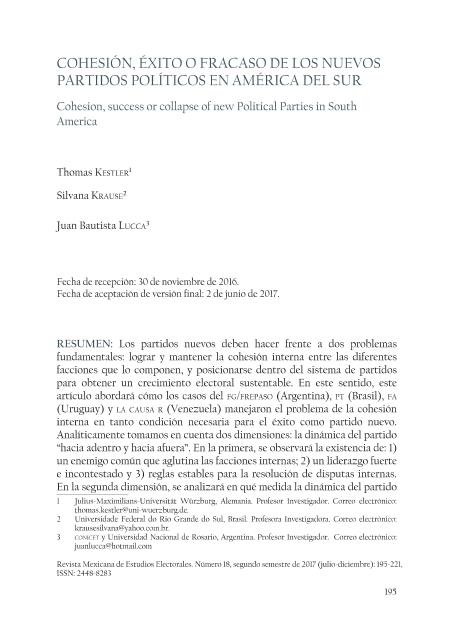Mostrar el registro sencillo del ítem
dc.contributor.author
Kestler, Thomas
dc.contributor.author
Krause, Silvana
dc.contributor.author
Lucca, Juan Bautista

dc.date.available
2019-04-30T14:01:36Z
dc.date.issued
2017-12
dc.identifier.citation
Kestler, Thomas; Krause, Silvana; Lucca, Juan Bautista; Cohesión, éxito o fracaso de los nuevos partidos políticos en América del Sur; Sociedad Mexicana de Estudios Electorales A. C.; Revista Mexicana de Estudios Electorales; 1; 18; 12-2017; 195-221
dc.identifier.issn
2448-8283
dc.identifier.uri
http://hdl.handle.net/11336/75291
dc.description.abstract
Los partidos nuevos deben hacer frente a dos problemasfundamentales: lograr y mantener la cohesión interna entre las diferentesfacciones que lo componen, y posicionarse dentro del sistema de partidospara obtener un crecimiento electoral sustentable. En este sentido, esteartículo abordará cómo los casos del fg/frepaso (Argentina), pt (Brasil), fa(Uruguay) y la causa r (Venezuela) manejaron el problema de la cohesióninterna en tanto condición necesaria para el éxito como partido nuevo.Analíticamente tomamos en cuenta dos dimensiones: la dinámica del partido?hacia adentro y hacia afuera?. En la primera, se observará la existencia de: 1)un enemigo común que aglutina las facciones internas; 2) un liderazgo fuertee incontestado y 3) reglas estables para la resolución de disputas internas.En la segunda dimensión, se analizará en qué medida la dinámica del partidohacia afuera refuerza o no la cohesión interna. Con vista a los cuatro casosque observamos suponemos que las reglas estables constituyen un factorprimordial para la cohesión interna y, consecuentemente, para su éxito.
dc.description.abstract
In the course of their development, new parties have to confront two fundamental problems: on the one hand they have to achieve and to maintain their internal cohesion between its different factions, and on the other hand, they have to find their place within the party system to grow electorally. The solution of both, interrelated, problems is necessary to open the way to success. On the basis of these considerations, this article addresses the original configuration and development of new partisan forces in South America, with special emphasis on the FG/FREPASO (Argentina), PT (Brazil), AF (Uruguay) and LA CAUSA C (Venezuela), focusing on the question how these parties dealt with the aforementioned problems and especially the problem of internal cohesion that we regard as a necessary condition for a new party’s success. We include two highly interrelated dimensions of analysis that collaborate to study the phenomenon of “party cohesion”: the inward oriented and outward oriented dynamics of each party. In the first dimension, we consider as relevant factors: 1) the existence of a common enemy that serves as a unifying factor, 2) the existence of a strong leadership, and 3) stable rules for the resolution of internal disputes. In the second dimension, we analyze the electoral performance and the dynamics of electoral mobilization. We content that both dimensions interact in furthering or impeding internal cohesion and, by extension, its path towards success.
dc.format
application/pdf
dc.language.iso
spa
dc.publisher
Sociedad Mexicana de Estudios Electorales A. C.
dc.rights
info:eu-repo/semantics/openAccess
dc.rights.uri
https://creativecommons.org/licenses/by-nc/2.5/ar/
dc.subject
Cohesión Partidaria
dc.subject
Sistema de Partidos
dc.subject
Partidos Nuevos
dc.subject
América del Sur
dc.subject.classification
Ciencia Política

dc.subject.classification
Ciencia Política

dc.subject.classification
CIENCIAS SOCIALES

dc.title
Cohesión, éxito o fracaso de los nuevos partidos políticos en América del Sur
dc.title
Cohesion, success or collapse of new political parties in South America
dc.type
info:eu-repo/semantics/article
dc.type
info:ar-repo/semantics/artículo
dc.type
info:eu-repo/semantics/publishedVersion
dc.date.updated
2019-01-02T19:24:57Z
dc.journal.volume
1
dc.journal.number
18
dc.journal.pagination
195-221
dc.journal.pais
México

dc.journal.ciudad
Ciudad de México
dc.description.fil
Fil: Kestler, Thomas. Universidad de Würzburg; Alemania
dc.description.fil
Fil: Krause, Silvana. Universidade Federal do Rio Grande do Sul; Brasil
dc.description.fil
Fil: Lucca, Juan Bautista. Consejo Nacional de Investigaciones Científicas y Técnicas. Centro Científico Tecnológico Conicet - Rosario; Argentina. Universidad Nacional de Rosario; Argentina
dc.journal.title
Revista Mexicana de Estudios Electorales
dc.relation.alternativeid
info:eu-repo/semantics/altIdentifier/url/https://www.somee.org.mx/rmestudioselectorales/index.php/RMEstudiosElectorales/article/view/211
Archivos asociados
